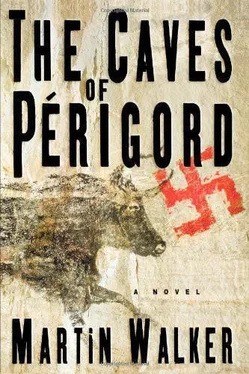Martin Walker - The Caves of Perigord
Здесь есть возможность читать онлайн «Martin Walker - The Caves of Perigord» весь текст электронной книги совершенно бесплатно (целиком полную версию без сокращений). В некоторых случаях можно слушать аудио, скачать через торрент в формате fb2 и присутствует краткое содержание. Жанр: Триллер, на английском языке. Описание произведения, (предисловие) а так же отзывы посетителей доступны на портале библиотеки ЛибКат.
- Название:The Caves of Perigord
- Автор:
- Жанр:
- Год:неизвестен
- ISBN:нет данных
- Рейтинг книги:4 / 5. Голосов: 1
-
Избранное:Добавить в избранное
- Отзывы:
-
Ваша оценка:
- 80
- 1
- 2
- 3
- 4
- 5
The Caves of Perigord: краткое содержание, описание и аннотация
Предлагаем к чтению аннотацию, описание, краткое содержание или предисловие (зависит от того, что написал сам автор книги «The Caves of Perigord»). Если вы не нашли необходимую информацию о книге — напишите в комментариях, мы постараемся отыскать её.
The Caves of Perigord — читать онлайн бесплатно полную книгу (весь текст) целиком
Ниже представлен текст книги, разбитый по страницам. Система сохранения места последней прочитанной страницы, позволяет с удобством читать онлайн бесплатно книгу «The Caves of Perigord», без необходимости каждый раз заново искать на чём Вы остановились. Поставьте закладку, и сможете в любой момент перейти на страницу, на которой закончили чтение.
Интервал:
Закладка:
“I don’t know yet,” she said lamely. “Excuse me, Professor, but I really ought to start looking through this stuff-the sooner I’m done, the sooner you can have it.”
“Horst, please. Not Professor,” he said, turning back to his laptop. “But good hunting. To both of us.”
As she sat at the microfiche and inserted the first of the miniaturized films into the reader, Lydia began thinking about how soon she could pretend to go to the ladies’ room, and warn Manners not to come into the library. Secrets and intrigue already, Lydia. How silly, as if the Germans were the enemy again. She turned to the spare prose of Malrand’s military report, so different from the florid style of his memoirs.
“My theory is that we save money on hotels and spend it on food and drink. I never saw the point in paying for an expensive hotel room when all you do is sleep in it,” said Manners. Which is just the sort of thing a chap would say to lull a girl’s suspicions, thought Lydia, as he led her into the dining room of the Centenaire. Two Michelin rosettes; she was looking forward to this.
They had left Bordeaux and the kindly old curator at six-thirty, Horst having long before been shown to the door as just another member of the public to whom closing hours applied. Claiming to have drunk no more wine, Manners had taken the wheel and the Jaguar had raced past mile after mile of vines: Lydia had seen the signs for St-Emilion and Lalinde de Pomerol and her mouth was watering already. At one crossroads, delving into the glove compartment to find a map, she found a small leather pouch, which she recognized as a traveling chess set. Well, well, she thought to herself, he does have hidden depths. After consulting the map, they had driven to a tiny hamlet, not much more than a bend in the road, a small river, and a pretty miniature chateau. Their Hotel du Chateau was just across the park, and she had a view of the turrets from her room. It might not be expensive, but it was well chosen. Manners allowed her precisely ten minutes to wash and change and they raced the three miles into Les Eyzies, parked, and walked into the restaurant with a few minutes to spare before 9 P.M. He was wearing a rather jolly pink tie with his blue suit. Given no time to iron her clothes, Lydia was playing safe in black cashmere and her expensive gray flannels. The restaurant was full, and moderately noisy, the clientele too discreet or self-absorbed to break off their conversation to study the latest arrivals. Shown to a large table by the wall, they ordered two glasses of Kir Royale and began to study their menus in silence.
“The menu for me. The foie gras, the sandre , and the duck,” he said as the somber gentleman approached with the wine list under his arm and his badge of office, the small silver tastevin, gleaming on his chest. Lydia ordered the foie gras and the fish, chose lamb instead of duck, and in serviceable French Manners asked the sommelier which wine he would recommend. Did Monsieur know the wines of the region, unpretentious but charming? Only the Jaubertie and Pecharmant, said Manners. A thoughtful nod, a courteous inquiry whether Monsieur had considered a Pomerol, and business was concluded with a glass of Monbazillac for the foie gras, some Badoit water with the fish, and a Chateau Nenin. It had been competently done, thought Lydia, looking appraisingly at her companion. An extremely grand restaurant, and he had surmounted the hurdle of ordering the wine without showing off, and with a courteous consideration for the sommelier’s expertise. She approved.
“Well, our adventure is shaping up according to all the proper conventions,” said Manners, as the two glasses of champagne arrived, touched with rose by the cassis. Another waiter brought some amuse gueuls, a morsel of salmon, some black pudding, and a small sphere of foie gras topped with a black flake of truffle. “We have a Holy Grail to look for, a chateau to stay in, an extremely fair maiden, and an enemy.”
“I think the most you can say of Horst is that he is a possible rival.” She smiled at him, enjoying the thought of herself as a fair maiden. She had related the encounter with Horst as they raced through the flat-lands of Gascony.
“Point taken. No dragon. Still, he’s German, which is the next best thing.” He grinned. Lydia had a feeling that nobody had ever told Manners he had a good smile, or if they had, he hadn’t paid attention. Looking at the healthy way he was polishing off the tiny snacks, he’d probably been too busy eating.
“Old Morillon, the chap in the library, has given me three leads,” he went on, after a swig of his Kir. “Three old men. One is from the Berger network who lives near a tiny village called Audrix. There’s an old railway man from the Communist FTP in le Buisson who worked with them. I have their addresses. And then there’s Soleil himself, still alive, but his memory is not what it was. But at least we have his memoirs, which do not mention my father. Apparently he used to be some kind of Communist, but broke with the party after the war. I have his phone number, but he was always very cautious about who he sees, so Morillon is going to call him on our behalf, and see if the old chap still has enough of his marbles to be worth seeing. That’s about it. Morillon himself was never north of Cahors, and only knew my father during the Toulouse operation. But he did say one thing about the Berger network that I found interesting. They sometimes hid the guns and ammo from the parachute drops in the remote caves along the Vezere valley. Caves were good because they protected the stuff from the damp, and he said my father was always on the lookout for a good cave.”
“That seems obvious, but it’s a useful connection,” she mused, tearing her attention away from the elusive taste of the truffle. “He could well have found a cave with paintings-except how has the cave remained unknown ever since? There must have been some local Resistance people in on the secret, if only to carry the weapons.”
“I asked Morillon if the caves weren’t too dangerous. They make terrible traps if the Germans were on their heels. And then probably some of the German troops would have been stomping around the better-known caves for their own interest. A lot of them apparently went to look at Lascaux itself, which was only discovered in 1940.”
“That reminds me. Among the microfiche I went through was something called the order of battle for Army Group G, under General Von Blaskowitz, in charge of defending southern France. It assigned him three armored divisions, one motorized and thirteen infantry divisions. How many troops would that be, Manners.”
“We normally reckon about ten thousand to a division, but armored divisions tend be larger and an SS panzer division would have twice that number. Then there are the troops attached to corps and army HQ. At least two hundred fifty thousand troops, but that was to hold down the whole of southern France, which contained something close to twenty million people. Not all of the troops were Germans, as Morillon said this afternoon. And a lot of the German infantry units were composed of old men or convalescents from the military hospitals. They had entire battalions of ulcer sufferers-it made it easier to organize their diet. Even the SS panzer division was being filled up with Volksdeutsch, the ethnic Germans from Czechoslovakia and Hungary and Alsace-Lorraine. Some of them didn’t even speak much German. And the troops were spread out, guarding the Atlantic and Mediterranean coasts, controlling the big cities like Lyon and Marseilles, the industrial centers like Clermont-Ferrand, patrolling the railways. Bear in mind that Perigord was not terribly important to the Germans, except for the rail and transport links. Not much industry, no great population centers, just a handful of important factories. They had the Vichy police and paramilitaries to do most of the patrols-and the dirty work.”
Читать дальшеИнтервал:
Закладка:
Похожие книги на «The Caves of Perigord»
Представляем Вашему вниманию похожие книги на «The Caves of Perigord» списком для выбора. Мы отобрали схожую по названию и смыслу литературу в надежде предоставить читателям больше вариантов отыскать новые, интересные, ещё непрочитанные произведения.
Обсуждение, отзывы о книге «The Caves of Perigord» и просто собственные мнения читателей. Оставьте ваши комментарии, напишите, что Вы думаете о произведении, его смысле или главных героях. Укажите что конкретно понравилось, а что нет, и почему Вы так считаете.












